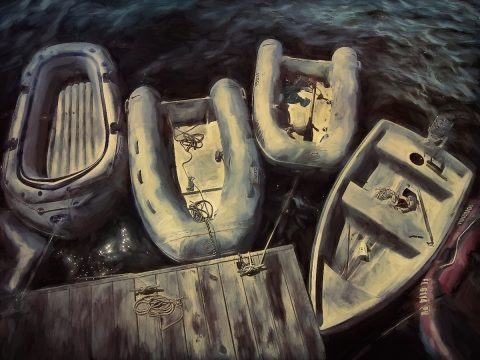I love the final image in your story—the protagonist imagining her aunt’s face “slick” and “proud,” this despite the terrible pain her aunt must have suffered from as a result of diving into the overly chlorinated pool. What’s one of your first memories of doing something dangerous because you had something to prove? Or, alternatively, what dangerous thing do you kind of wish you’d done?
My aunt had this really old, cement, in-ground pool when I was growing up. I used to go over and swim until it was dark and then she would chlorinate it before she brought me home. I remember watching her shake the chlorine over the water and asking what would happen if I jumped in. She said I would burn. She didn’t specify how I would burn, just that I would. I imagined the worst. My skin melting off, my bones turning to dust. But I still had the urge to jump in. In this piece, the protagonist jumps in the pool because she has something to prove. She wants to prove to herself that she can dive, and it can’t wait.
I wish I’d done a lot of things. Dangerous things. I wish I’d told people to fuck off. I wish I’d figured out what I wanted a lot sooner. I wish I did more things that made me uncomfortable. I wish I had put at least a pinky toe into that chlorinated pool just to prove to myself that I could.
If some dude you don’t know asked you to cauterize him in a hotel bathroom, what would be your price?
At least two Freezees, and I keep the change.
Your story is structured into five semi-long paragraphs, each separated by a space break. Would you talk about how this structure came about? Was it there immediately or did it come later? Why this structure?
I try to figure out the structure before anything else, “try” being the key word. You know, lay down the road so you know where you’re going and when it’s time to pull over. For this particular piece, the structure came after. The cauterization came first. I just re-read through the story in hopes of finding a suitable answer to these questions, but to be honest, I don’t know how or why. I think that’s what I love about structure. For me, sometimes it isn’t apparent. Sometimes it is a feeling. The way the words curve, the way they stop and breathe and start up again. I think that most times, the story chooses the structure. We just think we’re really good at figuring out why.
Describe a typical writing session for you. Where are you? What are you eating or drinking? What do you hear and smell? What else are you doing besides writing?
I never know how to answer these questions because I’m not a big fan of talking about process. About my process, about your process, about Hemingway’s process. I think it’s a time-filler in creative writing classes. I think part of why I dislike it so much is because it’s ever changing. I don’t have a typical writing session, and for me, that’s great. Your surroundings, to some extent, influence your writing, right? Your surroundings make you think, and a lot of the time, they show up in your work. I think it’s important to switch things up. Write outside. Write under the covers. Write in the bathroom.
We’re always writing. I remember reading something in a Lindsay Hunter interview that really resonated with me. She was talking about the sun, how she’s always trying to come up with new metaphors for it, how in a sense, every time she looks at it, she’s writing. I think that’s when I realized I’m always writing, too. Realized that we all are. That we don’t necessarily need to sit down at our desks with a cup of coffee and a cigarette, the window open, wet earth and cracked pavement and car engines and muffled tones seeping in, to write.
For each of the following categories, answer this question: If you were a (type of thing belonging to the category), what would you be?
- A fetish: Nebulophilia, an arousal to fog. For a while I was really into learning about obscure fears and writing them into stories. Maybe I’ll try fetishes now.
- An object in a hotel room: Those individually wrapped Q-tips.
- A genre of television show: I don’t know if this is necessarily a genre, but TLC. I wish I were as interesting as TLC.
- A dish prepared on a cooking show: Something that looks fancy but doesn’t cost a lot of money to make. Expensive food irritates me.
- A piece of advice: Avoid driving in a city. You will turn into the worst version of yourself.
- A poison: A peanut.



 The SmokeLong Grand Micro Contest (The Mikey) is now an annual competition celebrating and compensating the best micro fiction and nonfiction online.
The SmokeLong Grand Micro Contest (The Mikey) is now an annual competition celebrating and compensating the best micro fiction and nonfiction online.